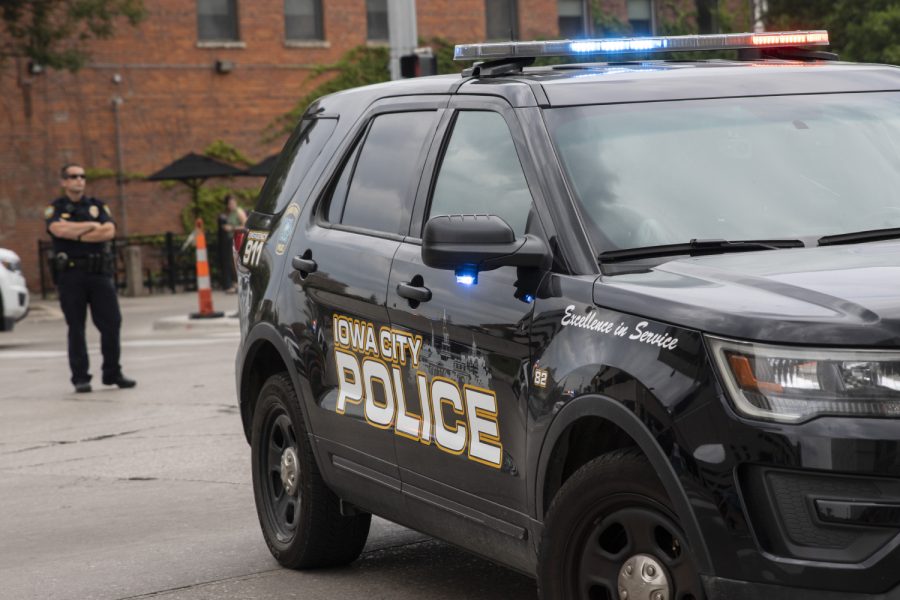Local disability support groups, ICPD working to implement de-escalation procedures
During a community listening post, local organizations spoke with city councilors concerning positive interactions between those with disabilities and law enforcement officers.
Iowa City Police Department vehicles are seen on July 9, 2019.
September 23, 2020
Local disability support organizations and Iowa City Police Department officers are working closely together to implement de-escalation processes for police who respond to residents with special needs in crises.
During the second of six Iowa City community listening posts, members from Access 2 Independence and the Village Community spoke with Iowa City City Councilors Susan Mims, John Thomas, and Janice Weiner on Tuesday night about their experiences in fostering positive relationships between those in the special needs community and Iowa City police officers.
Executive Director of Access 2 Independence Sarah Martinez said one of the organization’s priorities was to create a disability identification card program called Blue Able, which would allow individuals with disabilities to self-identify during crises or interactions with officers.
She said the identification card would provide context to officers who are conducting traffic stops or responding to a call, because each disability is specific to an individual and it’s difficult to create a uniform approach.
Though the spread of COVID-19 brought the development of the identification-card program to a standstill, Martinez said she hopes it will be up and running as soon as possible.
“I think, when we are ready and able, and if this comes to fruition again, that we really need to get back and push this,” Martinez said. “I think this is a really great opportunity to bring law enforcement and community members together to help foster positive interactions.”
Iowa City police officer and one of six Project Lifesaver responders Ashten Hayes said identification is important because it can help understanding situations in which an individual appears to be acting out, and assists officers in knowing how to handle the situation.
Project Lifesaver, an Iowa City police program, is a system in which family members or trusted individuals and someone with disabilities are connected through a watch and transmitter, which can be activated to an Iowa City police receiver if an individual with disabilities goes missing.
RELATED: City Council holds public forum to discuss mental health resources
Hayes added that Crisis Intervention Training is also important when entering a situation with someone who has disabilities.
“When people call the police, they expect us to come and solve these situations quickly and fast,” she said. “That is not what [Crisis Intervention Training] is. CIT is very calm and being collective and listening. It is very much a listening part of when you show up and when you talk to folks who are in a crisis. They want to know you’re hearing what they’re saying.”
University of Iowa Hospitals and Clinics autism specialist and President of The Village Community Mary Roberts said she has had positive experiences with the Iowa City Police Department both professionally and personally, as she has two adult children with severe autism.
Roberts said The Village Community wants its members to view law enforcement as helpers and a safe resource in case of a need for assistance.
“I’ve had multiple experiences with my own children where people who might be well-intentioned but not understanding what they’re seeing during a behavioral episode in the community would call the police on us, and I have had very positive experiences,” Roberts said. “[The police department] has made a point that they are accessible and want to form these relationships because it truly makes their job easier in crisis situations … We as a community and those of us who work in the field need to foster those relationships.”
During public comment, Iowa City resident Tammy Nyden asked the city councilors if there is a plan to have a Crisis Intervention Training unit separate from the police department to help prevent rising anxiety when those with disabilities or a mental-health illness encounter or see a police officer.
City Councilor Mims said she could envision Iowa City expanding Mobile Crisis, a program run through CommUnity, and integrating it with the police department. The city council is hoping to get as much community input as possible before moving forward with implementing a plan, she added.
Mims said that, during a time of protest against racial injustice after the death of George Floyd, she hopes for change across all institutions, in response to a comment about police presence and interaction with students with disabilities.
“Not only are the changes we make … reflective of the racial considerations and interactions, whether it’s with law enforcement, health care, education, etc.,” Mims said, “but I would hope it will bring about just looking more in depth about how we react to all kinds of people and their different abilities.”



